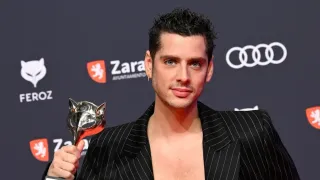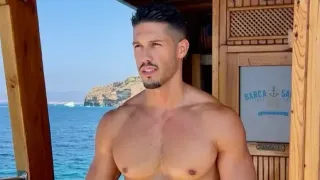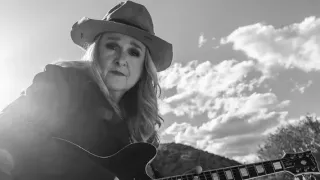October 12, 2018
First Man
Robert Nesti READ TIME: 4 MIN.
Filmmaking began with en.wikipedia.org/wiki/First_Men_in_the_Moon_(1964_film)|one delicious British film climbing inside it; but nothing before compares to the lonely trek that Neil Armstrong takes in "First Man," Damien Chazelle's breathtaking and somber account of the nine-year journey that brought him to the lunar surface.
It begins with Armstrong (Ryan Gosling) on the cusp of space – lingering on the edge of the atmosphere in a jet. It is a moment of quiet before his jet malfunctions and he's thrust higher and higher into space. The tense moment passes, but it is only a hint of what's to come. A word of warning, though: if you suffer from motion sickness, it may be best to take a Bonine before seeing this movie, especially in IMAX.
Chazelle, working with a script by Josh Singer from James R. Hansen's biography, follows Armstrong and his fellow NASA astronauts from the early space missions to the goal that President Kennedy set for them in 1961. But Chazelle doesn't present them with macho bravado – these guys have the right stuff in their quiet intensity. (They can even be jerks as in the case of Buzz Aldrin, played to the arrogant hilt by Corey Stoll.) In a way, the film offers the revenge of the nerds, with the laconic Armstrong at its center. Early on, he and his wife Janet (a phenomenal Claire Foy) lose their young daughter to brain cancer, and that death haunts the film; as do the deaths of Armstrong's colleagues who are killed in accidents while training for the space mission. When returning from a funeral of a fallen astronaut, Janet recalls an earlier year when Neil and her attended four funerals. "We got good at funerals that year," she says. Not that good, it turns out.
Neil and Janet have a complicated relationship: he is an emotional black hole, unable to express his feelings but only in the most clumsiest of ways. Early on, there's a lovely sequence when the couple awkwardly come together to dance to a schmaltzy instrumental (called "Lunar Rhapsody") and it's a moment that defines their relationship. Much of the time Janet reacts to Armstrong's remoteness with looks of exasperation and anger. She confesses that all she wanted was a normal life, but life with Armstrong has been nothing but and her years with him has left her brooding and anxious. (Just watching her suck on a cigarette to calm her nerves left me anxious.) She is the film's moral compass and one not afraid to say that the emperor has no clothes. At a particularly stressful moment, she confronts NASA officials when crucial information about Armstrong's mission is kept from her. "You're a bunch of boys making models out of balsa wood," she tells them. "You've got nothing under control."
Yet the space program succeeds, despite political bickering about costs, numerous setbacks and the rudimentary technology that would look right at home in a World War II movie. Watching the analog dials in the space capsules only makes you realize how far technology has come in the past 40 years and what an achievement NASA pulled off. What the film celebrates is that quiet determination that brought Armstrong to the moon's surface. It is in those moments when he climbs off the spacecraft onto the moon that the film's concurrent themes – one about the space program, the other about Armstrong's personal struggles – come together with a surprising, sentimental moment. That the film doesn't show Armstrong planting the flag (though it is seen in a long shot) has raised the ire of Fox News commentators, but they likely haven't seen the film. Such a scene would jolt the film's emotional trajectory, which climaxes with a touching gesture that brings the story full circle.
Ryan Gosling takes a less-is-more approach to Armstrong's complicated and thorny character. On one hand, he's a buttoned-up engineer who gets enormous pleasure when he solves a difficult calculus problem; on the other, he's a tough-as-nails pilot willing to take multiple spins on a gyroscope despite his obvious discomfort. He is a mass of contradictions – emotionally remote as the moon he stares at in moments of contemplation, but a playful dad with his sons, and a team player with his fellow astronauts. And he brings a lovely intimacy to his scenes with Foy, which have an authenticity of a relationship that neither comprehends fully. His performance offers a master class in control that dazzles with understatement.
Chazelle reinvigorated the movie musical with "La La Land," a romantic comedy with dark colors; here he takes on the space epic with a film that suggests the best of Clint Eastwood when it is earthbound and no less than Stanley Kubrick when it is in flight. The Kubrick references, specifically "2001," are self-conscious and beautifully realized, and function in much the same way that the nods to classic MGM musicals were so integral to "La La Land." When Armstrong reaches the moon – a vast, desolate black-and-white landscape – the fragility of the mission is all too apparent. "First Man" celebrates that moment, but also suggests that it may have been just a pyrrhic victory, especially for those men and women at the center of it.






